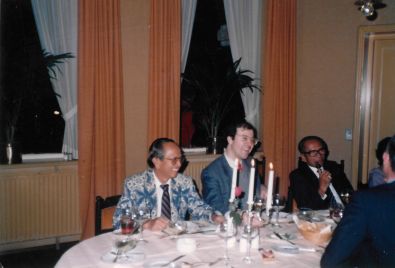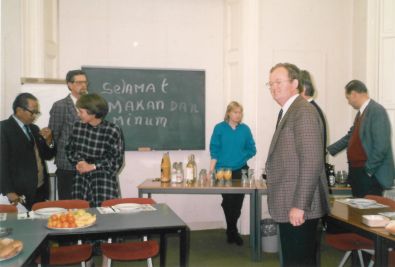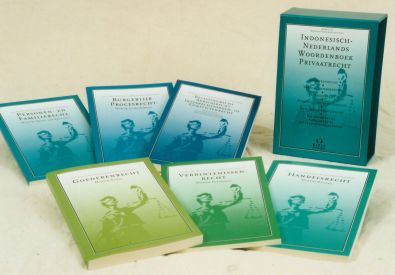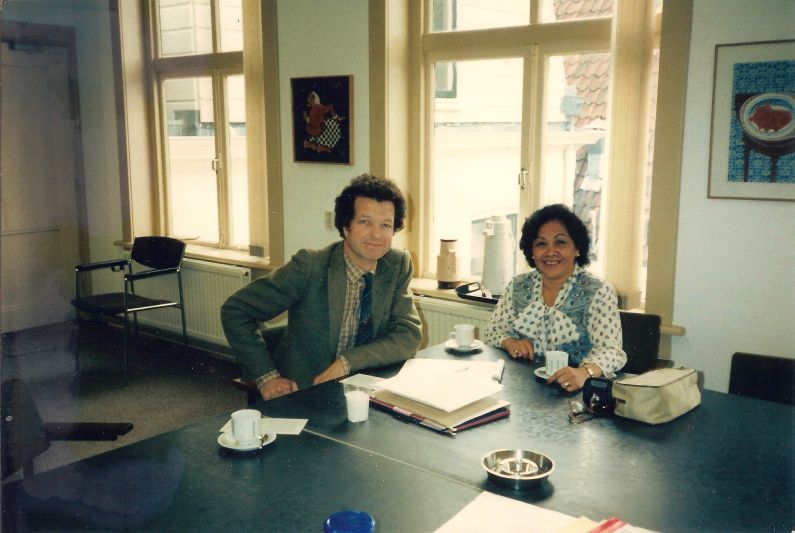Interview by Marjolein C. Groot, 18 June 2015
‘Insane’ undertaking
The political context of the legal cooperation with Indonesia in the 1980s was not entirely uncomplicated. In the Netherlands there were strong critics of the human rights practices and policies of the Indonesian government under President Suharto. Some Dutch universities had even adopted resolutions stipulating that there would not be any cooperation with Indonesia. Otto jokes: “It was a long time ago, Jan had a little bit more hair than now.” Van Olden: “I sure hope so.” Otto: “Conservative Leiden perceived Jan from the NUFFIC as a left extremist.” Van Olden: “And I had studied at the University of Amsterdam under supervision of professor Wertheim, who was also suspect.” Otto: “Professor W.F. Wertheim, the Amsterdam professor in Sociology of South East Asia, had worked as a legal scholar in the Netherlands Indies and had become a strong supporter of Indonesia’s independence. He had advised many government officials in the Sukarno era and former students of his were now ministers. In the Netherlands he was generally perceived as a key protagonist of the left.”
The press sensed that something controversial was going on and interviewed Wertheim. Otto recalls:
“The title of the interview read ‘Insane Undertaking’. In it Wertheim openly questioned the utility of any legal cooperation with Indonesia and its generals, who had put dissidents in concentration camps and were responsible for the killing of half a million inhabitants. He wondered how one could seriously believe they would favour a state based on the rule of law.”
Others, however, were less negative, because they felt that the Netherlands had introduced and left behind a largely Dutch legal system and that it now had the obligation to help Indonesia reform and improve it. Others again believed that to invest in and engage with the legal structures of the country would benefit the corporate sector. This was in line with thinking from the world of economics, trade and the World Bank, which argued that in order to become part of the world economy, national economies and legal systems needed to be modernised to create jobs, growth and prosperity.
Otto: “We both placed ourselves politically somewhere left of the centre. We were concerned about the gravity of the human rights violations. Nevertheless, with our working experience in Indonesia and other developing countries we were very aware that many Indonesians were critical of their own system and eager to learn more about alternatives. They aspired to use this legal cooperation to improve their system – but given the circumstances, we could not really advertise that. Instead, it required balanced programming with projects in criminal and criminal procedural law on the one hand, as they implicitly incorporated human rights training. On the other hand, through a programme in civil and corporate law, we were signalling to our supporters in the Netherlands that we did aim to support economic growth along the lines of Suharto’s policies and those of our Ministry of Economic Affairs.” Van Olden adds: “Even within our own Ministry of Foreign Affairs people were deeply divided on the matter.”
Swimming against the tide
In the expanding development sector of the 1980s, assistance in the field of law was not held in high regard. Otto and Van Olden agree that the experience they gained in Indonesia was at that time swimming against the tide. Van Olden: “Nobody else did it.”
Today CILC is engaged in rule of law projects just like hundreds of other organisations worldwide and rule of law itself might be listed among the successors of the Millennium Development Goals. But in the early 1980s, rule of law capacity building was not accepted very much in the development debate. The general mood was even rather against it. Various USAID funded rule of law projects in Latin America, in which enthusiastic practitioners and academics had tried to change legal systems in a short time, had failed and caused many frustrations. Otto: “The American law and development movement and their national Centre in New York, which had emerged in the late 1960s and early 1970s, were generally considered a failure. An influential article by academics David Trubek and Marc Galanter had criticised this law and development movement.” The authors wondered why the US, which, according to them, had a justice system deeply flawed by class bias and huge discrimination, would try to export it and impose it on other societies.


Otto: “They concluded that it was ok to build wells in other countries, but to export legal systems was considered madness. This mood was strongly supported by studies in the anthropology of law, which maintained that one cannot impose a ‘western’ legal system onto another society ruled by customary law, which is fundamentally different, as some kind of legal transplant.” Van Olden: “The underlying rationale of legal cooperation was also distrusted.” The human rights movement, on the contrary, argued that universal standards exist and must be imposed, at least gradually.
Opening windows
Van Olden: “We envisaged that when thinking long-term, it would be sensible despite the unfavourable political climate, to provide opportunities for Indonesian jurists to go abroad and establish contacts with colleagues from a different educational and professional background. In this way ‘windows would be opened’ and despite a rigid political regime, it might make change possible in the future. The people who would be educated abroad and gain insight in various contexts would return and take up positions in which they would be able to make a difference – or assist in such efforts.” The approach appeared to be effective. For example, the ‘sandwich program’ which enabled selected PhD students to do their research (partly) in the Netherlands produced more than 30 doctors of law, who made successful careers in the judiciary, academia and government, as professors, human rights lawyers, government advisers or even as Chief Justice.
An important weakness of the Indonesian legal education system was that it was very much separated from legal practice. For academics it was novel and beneficial to encounter fellow Indonesian participants from ministries or courts during a course. Otto: “The comprehensive type of cooperation, in which projects were carried out in parallel, both in the academic sector and with legal practitioners, created a unique opportunity to combine them. For example, we brought professionals from academia and legal practice together to discuss environmental laws and how they were applied in practice.” He notes that not only in Indonesia, but also in many developing countries there is a huge gap between laws on paper and their application.Otto:
“At the time, to study law in Indonesia was quite a sterile endeavour, with students not expected to study actual implementation and be critical towards existing laws as is common practice in our system. Here, the most important task of jurists is to analyse laws and case law critically. This is what most legal research is about. But if you are not allowed to be critical, such as was the case in Indonesia, knowledge transfer is reduced to simply presenting the existing laws to your students.”
Van Olden adds: “In part this happened by default: published case law was not well disseminated in Indonesia. One of our projects with the judiciary had been to encourage the Indonesian Supreme Court (Mahkamah Agung) to publish its rulings and several volumes with case law have been published since. Publication of case law is crucial for the academic education of lawyers, since they can consult and study existing case law to learn and discover the systematics of it.” Otto: “Today, you can even find case law of Indonesian district courts on the Internet.”
Success stories
 An important project at the time was the establishment of a research department at the Indonesian Supreme Court, along the lines of the one in the Netherlands, which is still operating. This bureau would collect, select and publish case law, and thus contribute to the preparation and study of verdicts. Another important project was to create legal dictionaries in Dutch-Bahasa and Bahasa-Dutch. Furthermore, several research projects were undertaken. Otto: “After it was decided that the Indonesian Supreme Court would be a key counterpart in our cooperation, I realised that we were lacking knowledge about its functioning and how rulings were actually made or how its judges were thinking, what their background was and how they dealt with political pressures. So a promising young researcher at the VVI, Sebastiaan Pompe, who later became legal advisor for the International Monetary Fund in Indonesia, undertook an in-depth dissertation research on the Supreme Court of Indonesia.”
An important project at the time was the establishment of a research department at the Indonesian Supreme Court, along the lines of the one in the Netherlands, which is still operating. This bureau would collect, select and publish case law, and thus contribute to the preparation and study of verdicts. Another important project was to create legal dictionaries in Dutch-Bahasa and Bahasa-Dutch. Furthermore, several research projects were undertaken. Otto: “After it was decided that the Indonesian Supreme Court would be a key counterpart in our cooperation, I realised that we were lacking knowledge about its functioning and how rulings were actually made or how its judges were thinking, what their background was and how they dealt with political pressures. So a promising young researcher at the VVI, Sebastiaan Pompe, who later became legal advisor for the International Monetary Fund in Indonesia, undertook an in-depth dissertation research on the Supreme Court of Indonesia.”
Another success story the founding fathers recall is the cooperation in the field of environmental law, very much a tailor-made process, involving both legislation and enforcement, which actually only began after Government-to-Government programmes were terminated by president Suharto in 1992. Otto: “Our academic cooperation then continued with an Indonesian NGO and it was tolerated.”
Otto continues proudly: “Something else we at the Council were, I believe, more or less the first to do was to develop legislative drafting courses. The Dutch Ministry of Justice was experimenting with it at that time. Today, many such courses are available, but then we commissioned the first five-month full-time course of the kind. It really had to be thought through, we had to gain experience and improve it. Developing such projects of international legal assistance became a new sort of profession and field of application and this experience could be transferred from Indonesia to other contexts.” In Otto’s view, the Council’s approach of intensive dialogue between the two countries, involving judges, government officials, NGOs and legislative drafters from both sides, supported by academic research, allowed them to obtain decent results. He acknowledges that for most lawyers this type of cooperation was completely new. “In general, lawyers are very much focused on their own legal system and are barely able to think outside this context. When they are asked for the first time to advise in a developing country on, for example, a law school curriculum, they may face various political and cultural shocks. Furthermore, they generally think within a rule-based paradigm: if it has been written in the laws, it will supposedly happen as written.”
Otto: “In spite of all who were against our cooperation, we did take a gamble, thinking that if you invest now, perhaps later… Today, 30 years down the line, we see that many participants in our projects became ‘change agents’ and reformers. So in the end, there was a point to it.”

Jan van Olden with Prof. Sunaryati Hartono, vice chairman of the National Ombudsman Commission of Indonesia since 2000
Going East
Throughout the legal cooperation with Indonesia, the bilateral political relations were always delicate, sometimes tense, eventually culminating in the termination of Dutch development cooperation by President Suharto on 25 March 1992. This was due to Indonesia’s anger about the harsh Dutch critique of its human rights violations, notably in East Timor, and about the high-handed sermonising of Jan Pronk, the Dutch Development Cooperation Minister. It had dramatic consequences for legal development cooperation.
Van Olden: “I remember the moment very well when the Dutch government received the letter from Mr Radius Prawiro, Coordinating Minister for Economy, Finance, Industry and Development Supervision, which terminated all our projects in Indonesia. Indonesia argued that the Netherlands used its funding for legal development cooperation as a political crowbar to promote human rights and put pressure on Indonesia.” Otto: “It meant in fact that all projects had to be wrapped up within two months and participants were to return to their respective countries.”
Van Olden: “In Indonesia, our counterparts were very disappointed but they did understand that we had to comply with the decision of their government to end the cooperation which was financed from the Dutch development budget. At home, our partners in the law schools were also deeply disappointed. We had a difficult decision to make: close down the Council, given its exclusive focus on Indonesia? Or could this knowledge and experience perhaps also be applied to different contexts and other regions?”






